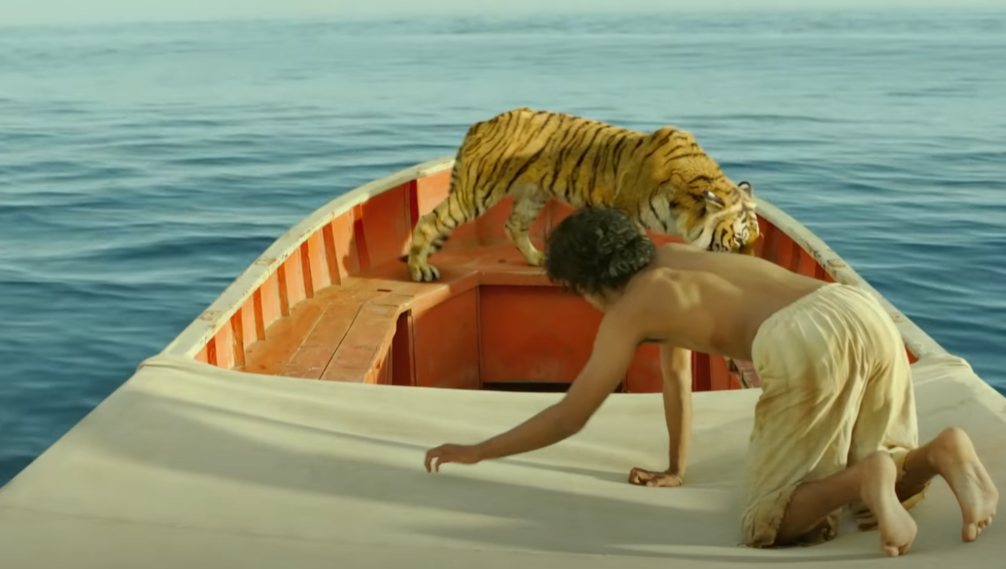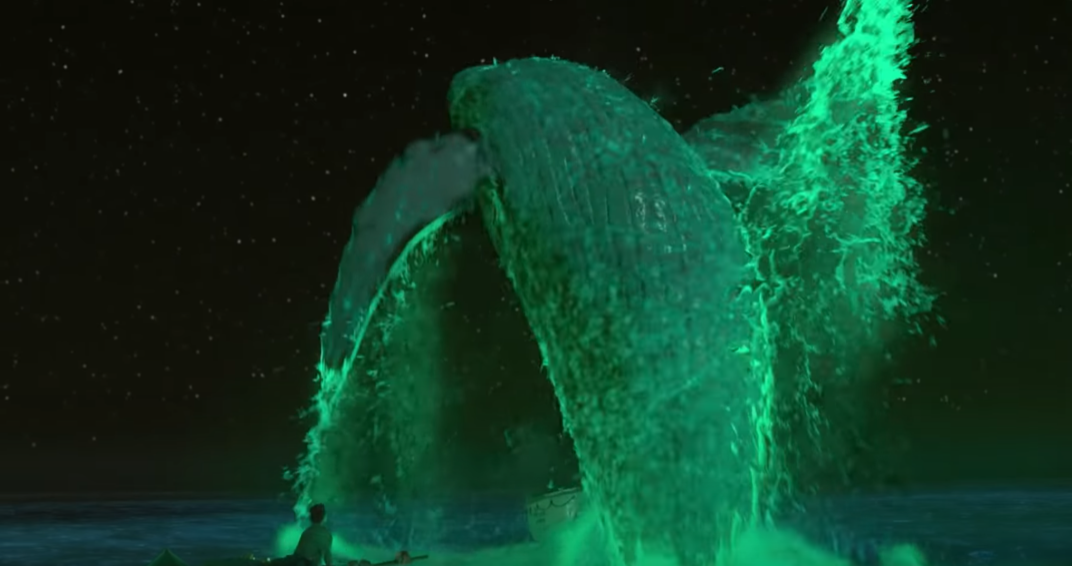Life of Pi is a 2012 adventure drama film directed by the academy award-winning Ang Lee, and based on Yann Martel’s 2001 novel of the same name.
The film was nominated for three Golden Globe Awards, including Best Motion Picture – Drama and Best Director. It won a Golden Globe for Best Original Score. At the 85th Academy Awards, it saw eleven nominations, most prominently in the categories Best Picture and Best Adapted Screenplay. It won four of its nominations (the highest number won on the show), one of which was Best Director for Ang Lee.
The protagonist of the film is the peculiar Piscine, whose name translates from French as „swimming pool“. His name gave him a lot of difficulties growing up in the English-speaking world as he was nicknamed “Pee”. Naturally, having a childhood with such a nickname was quite difficult, so Piscine decided to put an end to it and picked the nickname Pi (π) for himself. It wasn’t an easy task, making everyone call him Pi instead of Pee. So, on the first day of his first school year, while presenting himself, he decided to associate his name with the number π in all subjects. It finally bore fruit in math class when he wrote the decimals of the number for as long as the school board allowed it. Everyone was thrilled and that was how Pee became Pi. An awkward name and an even more awkward nickname awakened our hero’s resourcefulness and made him think outside the box. Aside from his name, Pi was unusual because of his interest in religion and faith, the exploration of truth, and the meaning of life. Pi grew up surrounded by animals at the Zoo owned by his father and was particularly fascinated by the Bengal tiger, an animal in which Pi saw more than a bloodthirsty predator. The tiger was named Robert Parker, an unusual name for an animal, and a far more normal name than Pi’s.

As an adolescent, Pi faced a major turning point in his life when his family planned to move from their homeland of India to Canada. Not only did the family move, but so did the entire Zoo, which was in financial trouble. Everyone was expected to experience a new, happier beginning, but instead experienced a shipwreck and met their death in the middle of the Pacific Ocean. All but the surviving Pi, who managed to escape his grueling end and remained trapped on a boat with a tiger, zebra, orangutan, and a hyena. Soon after only the tiger Robert Parker and Pi remained. They wandered the Pacific together for 270 days, discovering the limits of their mental and physical endurance.
At the beginning of the film, we meet a middle-aged Pi who is visited by a writer in search of a great story, so from the very beginning we know that Pi survived his unplanned adventure. We find out about Pi’s life through his retelling of events from his own life. Knowing that Pi survived provides a kind of relief, but it also takes away from the tension and uncertainty of the movie. In this case, this is not a problem, as the emphasis is not on adventure. The ocean is just a backdrop for discovering the deeper spheres of the human mind, soul, and the meaning of life. Life of Pi is a film that provides the viewer with visual enjoyment in almost every scene. The colors of the real-world frames, as well as the depictions of the protagonist’s inner thoughts will not leave the viewer feeling indifferent.

From the moment Pi and Robert Parker are left alone in the lifeboat we see the coexistence of two absolutely incompatible worlds; a wild animal and a man, who actually manage to save each other. Under such circumstances no one but Pi could have hoped to survive. His love of life and Robert Parker gave him meaning and the strength to endure. At the end of the voyage, when the boat finally reached the shore and the inspectors asked their questions about what happened that night when the Japanese ship sank, we see another dimension of the story, one I personally did not anticipate. Pi first told the inspectors the version of the story that we followed throughout the film, and then another version was told, one that was far more brutal and much more realistic. The animals on the boat were actually humans, and the tiger was Pi, his mind having recreated his image in the form of an animal he admired since his childhood.
In this rather unexpected turn of events Pi tells us his story and leaves it to the writer (and us) to choose which version is correct, the first in which he survived alongside animals, or the second one, in which the animals were actually people.
It is more likely, naturally, that Pi’s journey is an allegory. One that helped Pi survive, a negation of harsh reality, the mind’s defense mechanism. If we could sense that the story was about people alone, it would lose some of its magic. Some believe that grounding a story to reality, making it more believable, makes it lose some of its charm. Yet on the other hand, it is precisely because of this grounding that we become acquainted with the hidden power of the human, a moral and creative being, a power that helps us find the strength to survive in our most difficult moments.
When it came out in 2012, the film left a powerful impact on both critics and on audiences. In my case I’ve waited so long before watching it that I had the opportunity to hear and read a lot about it, and just as I had read a lot of conflicting reviews, my impressions of the film are likewise ambiguous. I don’t really know what to think of the film. I find myself agreeing with absolutely all of those reviews, whatever they say about it, because in my opinion everyone is right. No one that I’ve seen has said the film is bad, everyone agrees it has its qualities, but disagreements arise alongside the discussions on what the film actually represents, disagreements caused by the film offering each viewer their own conclusion. That’s why everybody’s right, both those who dislike the ending, and those who are absolutely delighted by it.

The film is turned into an enigma by its ending, which calls into question many elements of the story. For example, if the island inhabited by meerkats was real at all; an island that nobody can find, yet it ends up saving Pi’s life. Many of the film’s details are likely to be missed during the first watching, but some time needs to pass before you start your second. I wouldn’t call the film difficult to watch, but it’s also not something everyone could enjoy more than once, despite its fantastic visuals.
Life of Pi deserves a watch because it is quite difficult to explain in words what it is really about; what makes the film so special, and it really is a unique film that everyone should be given the chance to form their own opinions about.
Starring: Suraj Sharma (Piscine Molitor “Pi” Patel, age 16/17), Irrfan Khan (Pi, adult), Gautam Belur (Pi, age 5), Ayush Tandon (Pi, age 11/12), Rafe Spall (The Writer), Tabu (Gita Patel, Pi’s mother), Adil Hussain (Santosh Patel, Pi’s father)
If you think you may have missed something, please click on the button below to find out all about your favorite movie or series.

